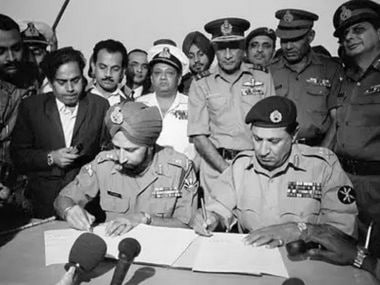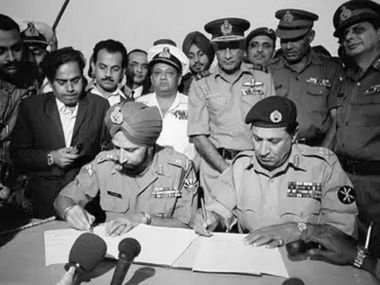There remain occasions in every nation’s history which are truly momentous; moments which give a nation greater sense of purpose, togetherness and pride. 16 December, 1971 was one such event in India’s modern history when it could truly sit back and bask in the glory achieved by its armed forces. It had created a new nation based on legitimate aspirations, vanquished a foe which only pursued a course towards the weakening and eventual destruction of India, and potentially secured itself for a future surge in effectiveness as an independent nation. On the 47th anniversary of that day, appropriately called Vijay Diwas or Victory Day, India celebrates. While most will attempt to recall the actions which led to that iconic victory and fete the armed forces, that may be insufficient on such a day. Besides familiarising the public with the basics of the national achievement, it is also important to bring to light the lessons from the aftermath of the victory. Perhaps Vijay Diwas should be more appropriately used to introspect on the state of national security; at different levels and with diverse understanding of the term “security”. [caption id=“attachment_5739711” align=“alignleft” width=“380”]  Pakistan’s Lt Gen AAK Niazi and India’s Lt Gen Jagjit Singh Aurora signing the Pakistani instrument of surrender on 16 December, 1971. The day is marked as Vijay Diwas. News18[/caption] First, it is important to get the context of the occasion. The backdrop to the War of 1971 was the state of politics in Pakistan where the Bengali Muslims of East Pakistan were clearly resistant to the idea of being subjugated by the dominant Punjabi and Mohajir influence. Besides language, it was the sharing of resources between East Pakistan and West Pakistan which created the cleavage. Sheikh Mujibur Rahman, father of the current prime minister of Bangladesh Sheikh Hasina Wajed, was illegally denied his electoral victory in 1970 by Pakistan’s ruling military coterie greatly influenced by Zulfiqar Bhutto, the hugely anti-India ex-foreign minister under Ayub Khan. The crisis spilled into the streets of East Pakistan and became a point of no return in March 1971. The Pakistan army launched a reign of terror on the Bengalis, exacerbating the situation with an initial displacement of a million refugees who spilled across the border into India. In a path-breaking set of strategic decisions under advice from the iconic Field Marshal (then General) Sam Manekshaw, Prime Minister Indira Gandhi awaited the right moment, prepared the nation and the armed forces, cultivated international opinion and signed the Indo-Soviet Treaty of Friendship and Cooperation, before launching India into a show of arms instigated by Pakistan. In 14 days of conventional war fighting aided by the Mukti Bahini (the nationalist guerilla force of Bengali Muslims) Pakistan was roundly defeated resulting in the creation of Bangladesh as a free and independent nation. 93,000 Pakistani prisoners of war who fell into Indian hands were treated humanely under the Geneva Convention; the Indian Army withdrew within ninety days from the captured territory newly named Bangladesh, as promised. The broad war strategy post the launch, which was a response to Pakistan’s brazen pre-emptive attack on Indian airfields on 3 December 1971, was to concentrate on the eastern front while executing offensive holding action in the west. An offensive holding action involves a series of limited offensive maneuvers which force the adversary to respond in strength, preventing it from redeploying those forces for more effective concentrated action at places of its choosing. In the east, three corps sized forces with approximately eight infantry divisions simultaneously advanced rapidly into East Pakistan from the north, east and west with clear directions of isolating islands of resistance and with intent to get to the centre of gravity, which was identified as Dhaka. It was clear that an early threat to Dhaka coupled with effective psychological warfare, would force the capitulation of all resistance. Two major operations paved the way further towards such break of will of the Pakistan Army; first the heliborne operation across the River Meghna after the bridge was found destroyed placed a force where Pakistan least expected; second the airborne operation at Tangail, close to Dhaka ensured psychological paralysis when seen in sync with Manekshaw’s tersely worded message – “…..do not lose time; there is no disgrace in laying down your arms to a soldier. We will give you the treatment befitting a soldier“. At the western front, it was important not to lose ground and ensure that the Pakistan Army remained off balance. The Indian Air Force (IAF) established clear superiority and the Indian Navy (IN) contributed through effectively blockading Karachi and launching seaborne attacks on its facilities. Some major actions for recall in ground operations were the raids led by Late Colonel Bhawani Singh, MVC with 10 Para Commando (now SF) in the desert terrain and the battle at Longewala in which Late Maj (later Brig) Kuldip Chandpuri, MVC along with the IAF thwarted the efforts of Pakistani armour from attempting to break through to Jaisalmer. There were enough acts of valour performed by different personalities of the three services to draw the appreciation of the nation. Major Hoshiar Singh of 3 Grenadiers, 2/Lt Arun Khetarpal of the Poona Horse, L/Nk Alebert Ekka of 14 Guards and Flt Lt Nirmaljit Singh Sekhon of the IAF, all won the Param Vir Chakra (India’s highest military honour in the face of the enemy) Now, for some observations. Pakistan continues to remain in a fallacious belief that it was never defeated militarily by India. It perceives that the Indian victory on the eastern front was courtesy the Mukti Bahini and in the west, nothing substantial was gained. The Indian public must view this from the angle of war aims. India achieved its aim of creating a new nation and permanently removing a threat in the east. It never had the resources to plan and destroy the Pakistan forces in the west; besides the time gap between the initiation and potential intervention by the international community was short and afforded only a limited aim, which was achieved. The conflict termination was on India’s terms, but the conflict resolution probably left far too much unresolved. That is a subject for another debate. Prime Minister Indira Gandhi was willing to accept military advice from Manekshaw for conflict initiation. Whether she endeavoured to take the same for the conflict resolution stage remains an issue in doubt. Manekshaw would probably have advised her on issues such as seeking resolution of Jammu and Kashmir and bargaining much harder for the return of the 93,000 PsW. The Shimla Agreement of 1972 did not comprehensively achieve what was intended, thus giving Pakistan the leeway to return to being a thorn on our side. It reneged on every aspect of the agreement and exploited the first opportunity to get back at India by launching the proxy war in Jammu and Kashmir in 1989, preceded by the support it provided to separatism in Punjab through the eighties. A major lesson for any government should be the fact that in as tenuous a situation as existed in March 1971, the armed forces were unprepared to fight and guarantee victory. It was the pragmatism and moral courage of Sam Manekshaw (sometimes even this is questioned since it is not officially recorded) that forced Prime Minister Indira Gandhi to delay the mission and allocate sufficient resources for the armed forces to ready themselves. Professional military advice in national security and especially emergent situations is something a political leader can ignore only at the cost of the nation’s peril. If the armed forces have to deliver, then they need to be at optimum preparedness levels at all time, especially now, when wars can be triggered on the basis of public anger and pressure instigated by major acts of terror on Indian soil. The nation needs to be complimented on Vijay Diwas, as much as the armed forces, because it is the people who make the latter what they are. However, it would only be appropriate that alongside celebration there should be introspection about the state of preparedness, should we ever be threatened again. The author is a retired lieutenant-general and former general officer commanding 15 and 21 Corps
Vijay Diwas was one such event in India’s modern history when it could truly sit back and bask in the glory achieved by its armed forces.
Advertisement
End of Article


)

)
)
)
)
)
)
)
)



